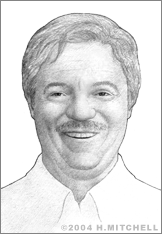Alan Kay
Computing pioneer Alan Curtis Kay, creator of the "Smalltalk" programming language, was born in 1940 in Springfield, Massachusetts. Shortly after his birth, his family moved to Australia where they lived for a few years before moving permanently back to the United States. He learned to read by age three and gained an early appreciation for music, thanks to his mother, a musician. He would later work as a professional jazz guitarist, composer, and theatrical designer and become adept as a classical pipe organist.
Kay attended Bethany College in West Virginia, but he was expelled in 1961 for protesting the Jewish quota there. He briefly turned to music, giving guitar lessons to support himself until he discovered his aptitude for computer programming. He was assigned to work on an IBM 1401 computer project for the U.S. Air Force. Later, he enrolled at the University of Colorado, where he completed his BS in Mathematics and Molecular Biology in 1966.
He continued his studies at the University of Utah, where he received his MS and PhD degrees in Electrical Engineering. While a graduate student, he worked on the Utah Advanced Research Projects Agency (ARPA) project and developed one of the most important concepts of his career — the idea of dynamic object-oriented programming.
Kay had come to the realization that computer users can and should interact with these powerful machines in many different ways, not just via text. He was one of the first scientists to recognize that it was possible to represent computer objects and capabilities as pictures. He developed this idea further by introducing the concept of object orientation. This work resulted in Kay’s creation of the first graphical object-oriented personal computer.
While working toward his PhD, which he completed in 1968, Kay became very interested in the education of young children and examined ways to build the new computing technologies that were being introduced to the world into teaching methods. In 1969, he began teaching at the Stanford University Artificial Intelligence Laboratory. He started thinking about how to design a small, compact, portable computer that kids could use and carry around in place of paper. As a result of his efforts, he created what is now known as the world’s first portable notebook, the “Dynabook,” which later helped to evolve the laptop computer industry.
In 1970, Kay joined Xerox's Palo Alto Research Center (Xerox PARC). There, he led a team working on the development of computer workstations. This was where Kay developed a long list of computing advances, not the least of which was Smalltalk, the first object-oriented programming language. This led to the development of operating systems with a graphical user interface, or GUI, as well as an entire genre of programming languages known as Object Oriented Programming. GUI systems were subsequently used in Apple's Macintosh operating system as well as in Microsoft Windows.
Additional research conducted by Kay and his team at Xerox PARC led to the development of Ethernet, client-server network architecture, desktop publishing, laser printing, and many other common computer technologies used all over the world today. More recently, Kay’s Smalltalk evolved an open-source version known as Squeak dynamic media software. Squeak continues to be a widely used, highly touted, and user-friendly system.
After Kay left Xerox PARC in 1983, he was named a Chief Scientist at Atari, where he worked for three years. He was also a Fellow of Apple Computer for 12 years, from 1984 to 1997. He then served for five years as Vice President of Research and Development and Disney Fellow at The Walt Disney Company in Los Angeles. In 2001, he founded a non-profit research organization, the Viewpoints Research Institute, in Glendale, California.
From 2002 to 2005, Kay was a Senior Fellow at Hewlett Packard Labs, researching and developing new software platforms for devices and distributed applications based on open-source code. He is currently the president of ViewPoints Research Institute and serves as an adjunct professor of computer science at the University of California in Los Angeles.
Kay's numerous honors and distinctions include the 2003 Turing Award, given by the Association for Computing Machinery, the Computers and Communication Foundation Prize, the Lewis Branscomb Technology Award, and the 2004 Charles Stark Draper Prize. In 2004, he was awarded the Kyoto Prize for Advanced Technology. He is a Fellow of the American Academy of Arts and Sciences, the National Academy of Engineering, and the Royal Society of Arts.


